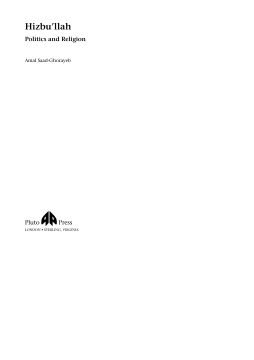
Additional Information
Book Details
Abstract
Hizbu'llah is the largest and most prominent political party in Lebanon, and one of the most renowned Islamist movements in the world. In this book, Amal Saad-Ghorayeb examines the organisation's understanding of jihad and how this, together with its belief in martyrdom, brought about the withdrawal of Israeli occupation forces from Lebanon in May 2000.
Saad-Ghorayeb explores the nature of the party's struggle against the West by studying its views on the use of violence against Westerners. Crucially, she also addresses the question of whether Hizbu'llah depicts this struggle in purely political or civilisational terms. The existential nature of the movement’s conflict with Israel is analysed and the Islamic roots of its anti-Judaism is unearthed.
The author explores the mechanics and rationale behind the party's integration into the Lebanese political system, and sheds light on how it has reconciled its national idenitity with its solidarity with the Muslim umma.
'The most detailed and scholarly analysis to date of the ideology of the Lebanese Shi'a radical Hizb'ullah'
CHOICE
'This is one of the very best works on the subject'
Middle East International
'A fine exposition of the evolution, the religious and political philosophy of one of the most important movements in the contemporary Middle East'
Tribune
Table of Contents
| Section Title | Page | Action | Price |
|---|---|---|---|
| Contents | vii | ||
| Acknowledgements | x | ||
| Introduction | 1 | ||
| Background of the Study | 1 | ||
| Objectives and Methodology | 3 | ||
| The Politicisation of the Lebanese Shi'ites and Subsequent Rise of Hizbu'llah | 7 | ||
| 1 Political Accommodation and Violence in Non- Islamic States | 16 | ||
| The Oppressors versus the Oppressed | 16 | ||
| Justifications for Political Violence and Accommodation in Relation to State Oppression | 22 | ||
| Political Accommodation with the Lebanese state | 25 | ||
| 2 The Islamic State and Democracy | 34 | ||
| The Islamic State Ideal | 34 | ||
| The Endorsement of Democracy | 46 | ||
| 3 The Concept of the Guardianship of the Jurisprudent | 59 | ||
| The Origins of the Concept of the Wilayat al- Faqih | 59 | ||
| Khumayni's Conceptualisation of the Wilayat al-Faqih | 61 | ||
| The Role of the Wilayat al-Faqih in the Political Thought of Hizbu'llah | 64 | ||
| 4 Islamic Universalism and National Identity | 69 | ||
| The Pan-Islamic Concept of Hizbu'llah | 69 | ||
| The Universalism of the Wilayat al-Faqih and the Islamic Republic of Iran | 71 | ||
| The Pan-Islamic Dimension of the Palestinian Cause | 72 | ||
| Solidarity with the Muslim Umma | 74 | ||
| The Primacy of Islamic Identity | 76 | ||
| National Identity and Nationalism | 78 | ||
| 5 The Struggle with the West | 88 | ||
| The origins of Hizbu'llah's Anti-Westernism | 89 | ||
| The Western Conspiracy Against Islam | 90 | ||
| The Double Standards of the West | 93 | ||
| Views on Political Violence as a Means of Confronting the West | 95 | ||
| The Rejection of Western Culture | 102 | ||
| The Struggle with the West as a Civilisational Dispute | 106 | ||
| 6 The Resistance to the Israeli Occupation of South Lebanon | 112 | ||
| The Resistance Priority | 112 | ||
| The Logic of Resistance | 118 | ||
| The Resistance to Israel as a Defensive Jihad and as the Fulfilment of the Religious Legal Obligation | 121 | ||
| The Centrality of the Notion of Martyrdom | 127 | ||
| 7 Anti- Zionism and Israel | 134 | ||
| The Excoriation of Israeli State and Society | 134 | ||
| The Zionist Essence of Israeli State and Society | 138 | ||
| Existential Dimensions of the Struggle with Israel | 142 | ||
| 8 Anti-Judaism | 168 | ||
| The Identification of Zionism with Judaism | 168 | ||
| Anti-Zionism versus Anti-Judaism | 171 | ||
| The Islamic Roots of Hizbu'llah's Anti-Judaism | 173 | ||
| Judaism as a 'Deviation' from the Revelation of Moses | 182 | ||
| Conclusion | 187 | ||
| Appendix One: Miladi Equivalents to Hijri Years | 192 | ||
| Appendix Two: List of Hijri Months | 193 | ||
| Glossary | 194 | ||
| Notes | 196 | ||
| Introduction | 196 | ||
| Chapter 1 | 198 | ||
| Chapter 2 | 203 | ||
| Chapter 3 | 208 | ||
| Chapter 4 | 211 | ||
| Chapter 5 | 215 | ||
| Chapter 6 | 222 | ||
| Chapter 7 | 226 | ||
| Chapter 8 | 232 | ||
| Select Bibliography | 235 | ||
| Articles and Books | 235 | ||
| Daily and Weekly Newspapers | 241 | ||
| Interviews by Author | 241 | ||
| Televised Interviews | 241 | ||
| Televised Speeches | 242 | ||
| Television Programmes | 242 | ||
| Index | 243 | ||
| Abdu 'llah bin 'Abdul' Aziz, Crown Prince of Saudi 80 | 80 | ||
| abductions, by Hizbu 'llah, | 1 |
